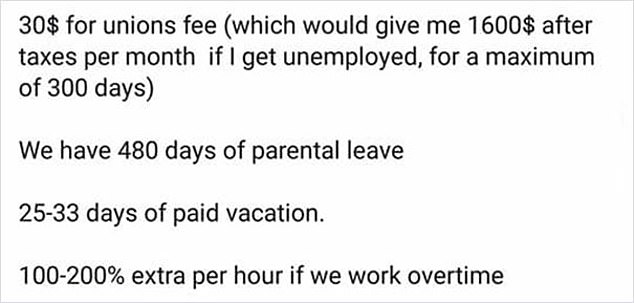"Scandinavianism?"I disagree with this usage of "socialism" too.
But why adopt their definition?
-
Welcome to Religious Forums, a friendly forum to discuss all religions in a friendly surrounding.
Your voice is missing! You will need to register to get access to the following site features:- Reply to discussions and create your own threads.
- Our modern chat room. No add-ons or extensions required, just login and start chatting!
- Access to private conversations with other members.
We hope to see you as a part of our community soon!
You are using an out of date browser. It may not display this or other websites correctly.
You should upgrade or use an alternative browser.
You should upgrade or use an alternative browser.
Socialism: evil impact
- Thread starter sun rise
- Start date
That's better."Scandinavianism?"
But they are gifted with a high opinion of themselves.
Just like everyone outside of people with "inferiority complexes" as we used to speak about.
If that's the criteria for anything, then 99.41% of humanity is guilty.
Fixed.Just like everyone outside of people with "inferiority complexes" as we used to speak about.
If that's thecriteriacriterion for anything, then 99.41% of humanity is guilty.
Subduction Zone
Veteran Member
Oh the humanity! How do I undo the spoiler alerts?This is horrible, of course. How dare Democrats take even a step down this path to ruin. The sordid details: Swedish citizen stuns Americans with post about Nordic life | Daily Mail Online Some of the details are hidden so as not to disturb people who are easily bothered by such images.
(I am of course trolling)



One cannot simply create a model with a spectrum, & claim this as
evidence that real world examples exist throughout it.
Socialism applied to an entire country will necessarily be authoritarian
for reasons given earlier. History bears this out where it's been
implemented, eg, China, USSR, Kampuchea, Cuba, N Korea.
There are no contrary examples.
However, capitalism does have historical & current examples
on the liberty side of the spectrum. Note....I don't claim any
such foolishness as purity or perfection for capitalism.
Although I know we've discussed this in the past, one thing that should be noted is that all of these countries you list have since changed and reformed of their own accord through peaceful means. Even Cuba and North Korea seem to be mellowing out a bit these days. They're not really like they used to be.
Countries can and do change. Ideologies can change or be revised based on learning from mistakes of the past. The countries you cite here were ravaged by war and/or revolution, along with a lot of bad blood and vengeful, vindictive sentiment.
At least in terms of learning from historical examples, I think it would be prudent and wise to avoid the kinds of extreme conditions which led to revolution and civil war in those countries. The policies generally supported by liberals and progressives, such as civil rights, the labor movement, the peace movement, consumer protection, aid to the poor and indigent, education, healthcare - these are all ways of avoiding extreme conditions that lead to revolution.
I don't think anyone is advocating a society like North Korea. Ultimately, the American people will have to decide which kind of government they prefer. They've made their choice for now, although the squabbling continues. I just hope that things don't get too crazy over this.
Shadow Wolf
Certified People sTabber
There's actually quite the debate to put up a fine division between communism amd socialism because definitions overlap amd don't necessarily agree when it comes to what makes one communist and what makes one socialist. Common ownership and equal division of resources, and from there people scratch their heads because thats basically both.It should be simple.
"Socialism" has definitions different from what many of its fervent
fans & detractors use. If you want capitalism & a wonderful social
safety net, then it should be called something that doesn't preclude
the very capitalism that fuels it.
If we want democracy, social services, & capitalism, then how about
"Democratic social capitalism"?
Some things, really and truly, an encyclopedia is vastly superior to a dictionary. Dictionaries are great for words, but they are horrendously inadequate for concepts. Stuff like this is more comparable to a dictionary being a card catalog entry about a book, and the encyclopedia being the Spark notes for the book, and the concept being discussed being the book itself.
Another good example is masculine and feminine. In a dictionary these words often are given circular definitions and thus never really define them.
If it is not socialism...then why the Americans have no single-payer universal healthcare yet?This, of course, is not socialism.
It is a mild form of social market democracy.
Subduction Zone
Veteran Member
Because deep down inside we are masochists.If it is not socialism...then why the Americans have no single-payer universal healthcare yet?
exchemist
Veteran Member
I think it's because (a) there would have to be a step-change in taxation to do it, which is politically unpalatable, even if it saves people paying for private insurance, and (b ) there are powerful corporate interests (medical, pharmaceutical, insurance) who will do their damnedest to stop it, because the efficiency of central procurement will bring their gravy train to a halt.If it is not socialism...then why the Americans have no single-payer universal healthcare yet?
The UK, and I think most of Europe, put universal healthcare into place shortly after the war, when people were poorer and more grateful for the state to take the problem of health off their hands and fund it through tax. Selling the benefit now, especially to those Americans who at least think they have a steady job with an insurance plan, is a far tougher sell.
The label "socialism" is thrown around by those corporate interests and their friends in politics, as a scare word to kill the idea.
I think it's because (a) there would have to be a step-change in taxation to do it, which is politically unpalatable, even if it saves people paying for private insurance, and (b ) there are powerful corporate interests (medical, pharmaceutical, insurance) who will do their damnedest to stop it, because the efficiency of central procurement will bring their gravy train to a halt.
The UK, and I think most of Europe, put universal healthcare into place shortly after the war, when people were poorer and more grateful for the state to take the problem of health off their hands and fund it through tax. Selling the benefit now, especially to those Americans who at least think they have a steady job with an insurance plan, is a far tougher sell.
The label "socialism" is thrown around by those corporate interests and their friends in politics, as a scare word to kill the idea.
...which is dangerous for us too...if you think about it. Some Eueopean political parties might advertise the privatizations of the various NHSs, presenting the American model as better.
exchemist
Veteran Member
That would be insane, given its gross inefficiency and manifest weaknesses....which is dangerous for us too...if you think about it. Some Eueopean political parties might advertise the privatizations of the various NHSs, presenting the American model as better.
In European countries there is, and always has been, a parallel private health sector, funded by private insurance, for those that can afford it and are persuaded of its benefits. So nobody is denied freedom of choice by the state health provision. The only argument you could make would be if you said you would reduce taxes. But since everyone would then need to pay for private health insurance, which would cost them more, I can't see how that would appeal much.
You & I might be thinking of different N Koreas & Cubas.Although I know we've discussed this in the past, one thing that should be noted is that all of these countries you list have since changed and reformed of their own accord through peaceful means. Even Cuba and North Korea seem to be mellowing out a bit these days. They're not really like they used to be.
The PRC did become less authoritarian, but only after embracing capitalism.Countries can and do change. Ideologies can change or be revised based on learning from mistakes of the past. The countries you cite here were ravaged by war and/or revolution, along with a lot of bad blood and vengeful, vindictive sentiment.
There's still no avoiding the strong correlation betweenAt least in terms of learning from historical examples, I think it would be prudent and wise to avoid the kinds of extreme conditions which led to revolution and civil war in those countries. The policies generally supported by liberals and progressives, such as civil rights, the labor movement, the peace movement, consumer protection, aid to the poor and indigent, education, healthcare - these are all ways of avoiding extreme conditions that lead to revolution.
I don't think anyone is advocating a society like North Korea. Ultimately, the American people will have to decide which kind of government they prefer. They've made their choice for now, although the squabbling continues. I just hope that things don't get too crazy over this.
socialism & authoritarianism, & the inherent reason for it.
It's still wrong to use a personal definition of a wordThere's actually quite the debate to put up a fine division between communism amd socialism because definitions overlap amd don't necessarily agree when it comes to what makes one communist and what makes one socialist. Common ownership and equal division of resources, and from there people scratch their heads because thats basically both.
Some things, really and truly, an encyclopedia is vastly superior to a dictionary. Dictionaries are great for words, but they are horrendously inadequate for concepts. Stuff like this is more comparable to a dictionary being a card catalog entry about a book, and the encyclopedia being the Spark notes for the book, and the concept being discussed being the book itself.
Another good example is masculine and feminine. In a dictionary these words often are given circular definitions and thus never really define them.
that conflicts with all dictionaries. That's what some
cons do with "socialism". Don't be like them.
But if personal definitions are to rule, then all Democrats
would be "commie fascists".
You & I might be thinking of different N Koreas & Cubas.
Well, we haven't had any Cuban Missile Crises lately, have we? Or any Korean Wars? Even American tourists have gone to Cuba and North Korea, which would have been unheard of 20 years ago. You can't deny that they're mellowing.
The PRC did become less authoritarian, but only after embracing capitalism.
Chicken and egg.
There's still no avoiding the strong correlation between
socialism & authoritarianism, & the inherent reason for it.
Then why don't capitalists understand the correlation between mistreating large segments of the population and revolution? Why did capitalists have to be forced to end slavery, forced to end child labor, and forced to end sweatshops? You may call it "authoritarianism" (as many capitalists do), yet why couldn't they do the right thing of their own free will? Why does it have to come down to authoritarianism and force to get capitalists to do what is best for society?
The correlation is between misbehaving capitalists and authoritarianism, which is the inherent reason for it. We wouldn't have to go to full-blown socialism if society agrees to rein in and clamp down on capitalist mischief, but the reason that doesn't happen is because of too many capitalists running interference to protect the bad apples among them.
Not that I know of. But remember that back then, the USSRWell, we haven't had any Cuban Missile Crises lately, have we?
(prime mover behind the Cuban missiles) was socialist.
It's been replaced with capitalistic Russia.
About tourism in N Korea....Or any Korean Wars? Even American tourists have gone to Cuba and North Korea, which would have been unheard of 20 years ago. You can't deny that they're mellowing.
Otto Warmbier - Wikipedia.
N Korea is still one giant prison camp.
Oh Chong-song - Wikipedia
Nah. There are systemic reasons for less oppression inChicken and egg.
capitalistic PRC...
1) No need to prevent free economic association.
2) Free economic association has led to more exposure
to foreigners.
3) Greater prosperity enabled easier communication.
People of all stripes are bad at understanding other people.Then why don't capitalists understand the correlation between mistreating large segments of the population and revolution?
But mistreatment of people is at its worst under socialism/communism,
which has the biggest record of famine & pogroms.
I think you're asking this question as a criticism of evils that can happenWhy did capitalists have to be forced to end slavery, forced to end child labor, and forced to end sweatshops?
under capitalism. This is a red herring. Capitalism can have evil within.
That isn't in dispute, & isn't the issue.
But addressing forced labor, nowhere is it worse than under socialism.
See my answer above.You may call it "authoritarianism" (as many capitalists do), yet why couldn't they do the right thing of their own free will? Why does it have to come down to authoritarianism and force to get capitalists to do what is best for society?
Capitalism isn't perfect.
It just works better than socialism.
One cannot argue that socialism is better than capitalismThe correlation is between misbehaving capitalists and authoritarianism, which is the inherent reason for it. We wouldn't have to go to full-blown socialism if society agrees to rein in and clamp down on capitalist mischief, but the reason that doesn't happen is because of too many capitalists running interference to protect the bad apples among them.
by citing evils that have existed under the latter. This
avoids comparison of results.
Some day, they'll come up with a standard term to
describe a capitalist country with a strong social
safety net.
In Florida there is a community referred to as 'Little Cuba'. They always vote republican. Understandably, they're idea of a 'social safety net' is the Cuba they fled.
Socialist social safety nets leave much to be desired.In Florida there is a community referred to as 'Little Cuba'. They always vote republican. Understandably, they're idea of a 'social safety net' is the Cuba they fled.
I know people who fled socialism (USSR & China).
But none who fled capitalism.
Not that I know of. But remember that back then, the USSR
(prime mover behind the Cuban missiles) was socialist.
It's been replaced with capitalistic Russia.
About tourism in N Korea....
Otto Warmbier - Wikipedia.
N Korea is still one giant prison camp.
Oh Chong-song - Wikipedia
Nah. There are systemic reasons for less oppression in
capitalistic PRC...
1) No need to prevent free economic association.
2) Free economic association has led to more exposure
to foreigners.
3) Greater prosperity enabled easier communication.
People of all stripes are bad at understanding other people.
But mistreatment of people is at its worst under socialism/communism,
which has the biggest record of famine & pogroms.
I think you're asking this question as a criticism of evils that can happen
under capitalism. This is a red herring. Capitalism can have evil within.
That isn't in dispute, & isn't the issue.
But addressing forced labor, nowhere is it worse than under socialism.
See my answer above.
Capitalism isn't perfect.
It just works better than socialism.
One cannot argue that socialism is better than capitalism
by citing evils that have existed under the latter. This
avoids comparison of results.
I'm not necessarily arguing that socialism is "better" than capitalism. I think that's the red herring here, since "better" is a subjective judgment depending on individual points of view.
What I'm arguing here is that the authoritarianism you cite in the examples above is the direct result of revolution which was ultimately caused by capitalist mischief and indifference.
Since you apparently support capitalism, then wouldn't you agree that it would be in the best interests of that system to rein in and clamp down on those capitalists who are mischievous and misbehave? I don't think it's a good idea to cavalierly dismiss valid criticisms of capitalism as "red herrings."
I thought we were in agreement that authoritarianism & economic failure were bad.I'm not necessarily arguing that socialism is "better" than capitalism. I think that's the red herring here, since "better" is a subjective judgment depending on individual points of view.
So you're blaming capitalism for the failure of socialism?What I'm arguing here is that the authoritarianism you cite in the examples above is the direct result of revolution which was ultimately caused by capitalist mischief and indifference.
I've long been an advocate of reasonable regulation in concert with economic liberty.Since you apparently support capitalism, then wouldn't you agree that it would be in the best interests of that system to rein in and clamp down on those capitalists who are mischievous and misbehave? I don't think it's a good idea to cavalierly dismiss valid criticisms of capitalism as "red herrings."
The "red herring" is justifying socialism by pointing to problems under capitalism.
I'm comparing the 2 systems. Socialism necessitates authoritarianism, as borne
out by its history. And then it also tends have more famines & pogroms.
